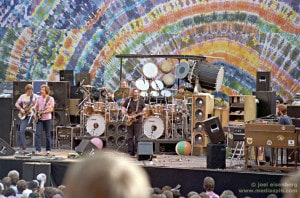- The May 8, 1977 Performance At Cornell University’s Barton Hall,
- Revered By Many As The Best Grateful Dead Show Of All Time,
- First Official Release Following Acquisition Of “Betty Board” Master Tapes
- Available As A 3-CD Set, 5-LP Set
LOS ANGELES – The Grateful Dead played more than 2,000 concerts, but none continues to spark interest and provoke discussion quite like the band’s performance at Cornell University’s Barton Hall on May 8, 1977. It is one of the most collected, traded, and debated concerts by any band ever, has topped numerous fan polls through the years, and was a favorite of the group’s longtime archivist Dick Latvala, who stated: “Enough can’t be said about this superb show.” Even Uncle Sam got into the act in 2011 when the recording was “deemed so important to the history and culture of the United States” that a copy was added to the Library of Congress’ National Recording Registry.
To celebrate the 40th anniversary of that magical show, Rhino will release the Barton Hall concert separately in multiple formats on May 5. CORNELL 5/8/77 will be available as a three-CD set , a limited edition five-LP set (limited to 7,700 copies)
CORNELL 5/8/77 is sourced from the legendary Betty Boards, which Jeffrey Norman has mastered in HDCD for unrivaled sound quality. The transfers from the master tapes were produced by Plangent Processes, further ensuring that this is the best, most authentic that Cornell (and the other three shows) has ever sounded.
“Cornell has been the holy grail of wish-list releases both externally and internally for a long, long time,” says David Lemieux, Grateful Dead archivist and the set’s producer. “ During the 18+ years I’ve worked with the Grateful Dead, no concert has garnered as much attention and as many requests for release as Cornell. For those who didn’t know the history of these master tapes and about their absence from the band’s vault, and for those who have, like us, lamented this hole in the collection, we join with you in celebrating what might be, minute-for-minute, song-for-song, the most high quality Grateful Dead release ever produced.”
Jerry Garcia, Donna Jean Godchaux, Keith Godchaux, Mickey Hart, Bill Kreutzmann, Phil Lesh and Bob Weir had just completed Terrapin Station, the band’s ninth studio album, when they hit the road for a spring tour leading up to the album’s release in late July. This string of performances is widely regarded as a high-water mark in the Dead’s history.
The set list played at Barton Hall offers up sweeping retrospectives of the band’s career, touching on the early psychedelic days (“Morning Dew” and “St. Stephen”), and the rootsy early-Seventies (“Jack Straw”) up to and including previewing songs from the group’s then-unreleased album Terrapin Station (“Estimated Prophet”)
Elevating this already extraordinary release is the fact that the recordings are sourced from the fabled Betty Boards, which are soundboard tapes made by Betty Cantor-Jackson, who was the Dead’s live recording engineer for many years. Since some of her tapes began circulating in the 1980s, her live recordings of the band have become the gold standard by which others are measured. After decades in limbo, more than 350 reels of her recordings are now part of the Grateful Dead’s musical vault. The July 1978 set released last year represented the first official release of the Bettys, with even more to come after CORNELL 5/8/77.
In the set’s liner notes, Meriwether captures how the Cornell show pulls together many of the disparate strands of the Grateful Dead phenomenon and the Deadhead experience, from the music and experience of the show to its recording and dissemination. “The story of Cornell ’77 is more than just a tale of another great Dead show, another enduring example of what [Dick] Latvala called ‘primal Dead’: It is the stuff of history and legend, myth and mystery, and how those all played out to finally produce this long-awaited, much anticipated release, forty years after the last notes of ‘One More Saturday Night’ rang out in the drafty, cavernous confines of Barton Hall that night.”







